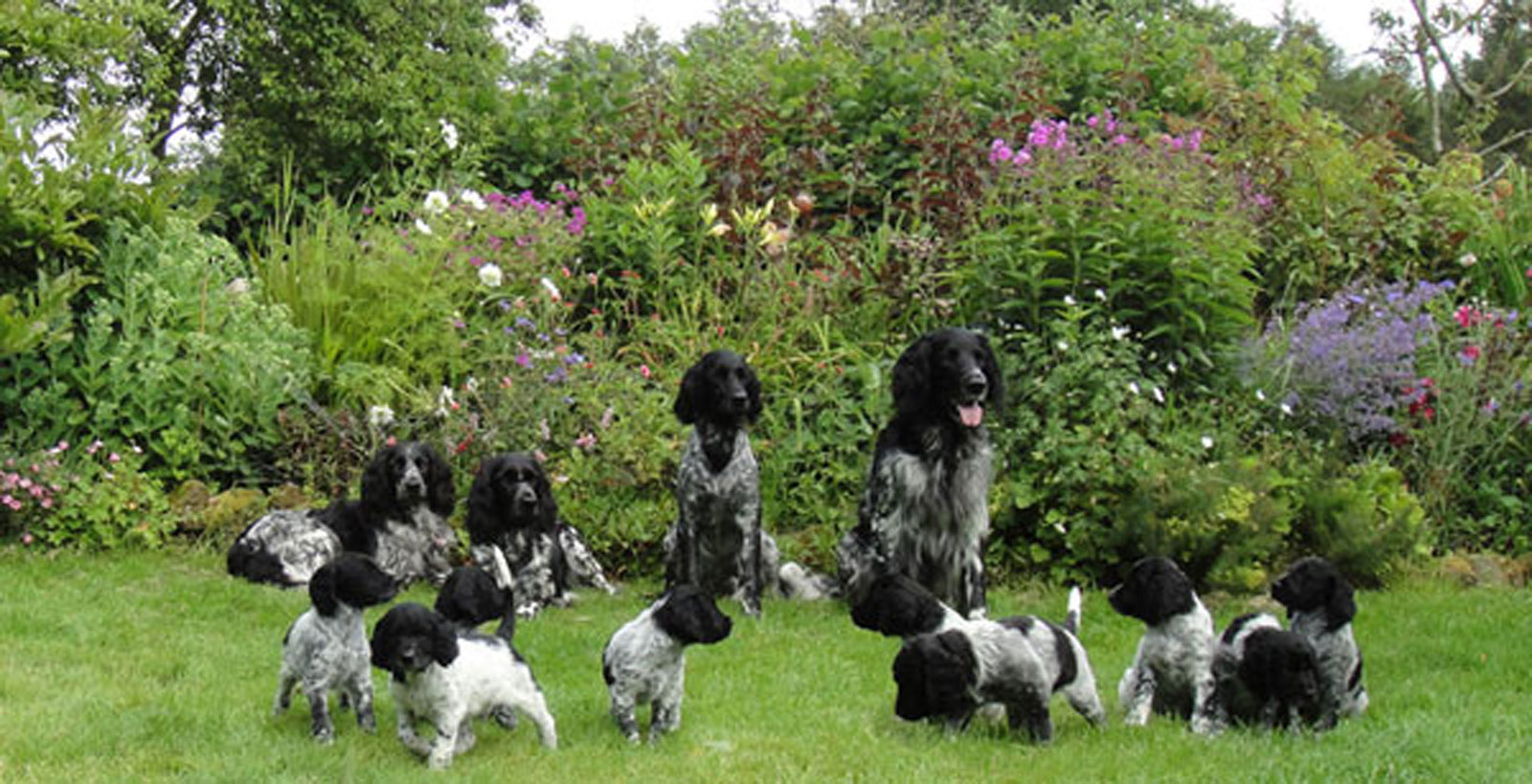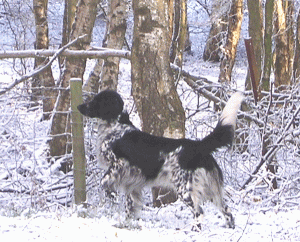
About the Large Munsterlander
We have had Large Munsterlanders since 2004. Ashlowrick Ingleswood (Willow) produced our first litter when mated to SH CH Tanzenbach Chevalier Sh CM (Jasper). This litter was the beginning of our passion for the breed.
Large Munsterlanders are first and foremost HPR gundogs bred to hunt, point and retrieve game. They have a strong working instinct which needs to be channelled with firm consistent training at an early age. Munsters are energetic, athletic, eager to learn and adore human contact. They are incredibly affectionate, love laps & cuddles, irrelevant of how wet and muddy they are! In the right hands they make wonderful pets, excellent rough shooting dogs and are more than capable of doing obedience, agility ,canicross , in actual fact whatever you choose, as long as they have plenty of physical and mental stimulation. Also, something which I love is the similarity between the show dog and the working dog, not the case with a lot of other gundog breeds.
There is lots of information available on the Large Munsterlander Club website www.largemunsterlanderclub.co.uk
General Appearance
Alert and energetic, with strong muscular body, having good movement with drive.
Multi-purpose gundog, ideal for the rough shooter. Excellent nose, staying power, and works equally well on land and in water. A keen worker, easily taught.
Temperament
Loyal, affectionate and trustworthy.
Head and Skull
Well proportioned to body, elongated. Skull sufficiently broad, slightly rounded, with no pronounced occiput. Strong jaw muscles, well formed black nose, wide soft nostrils, slight rise from the nasal bone to the forehead but no pronounced stop. Lips slightly rounded, and well fitting.
Eyes
Intelligent, medium size, dark brown, not deep-set or protruding. No haw showing.
Ears
Broad and set high, lying flat and close to the head, with a rounded tip. Hair on the ears should be long, extending beyond the tip.
Mouth
Strong and sound, with well developed teeth, with a perfect, regular and complete scissor bite, i.e. upper teeth closely overlapping lower teeth and set square to the jaws.
Neck
Strong, muscular, slightly arched, joining the shoulder and chest smoothly.
Chest, wide and with good depth of brisket. Shoulders laid well back, forelegs straight, pasterns strong.
Body
Firm, strong back, short coupled, slightly higher at the withers, sloping smoothly towards the croup and tail. Wide, well-muscled loin, wide croup, ribs well sprung, deep and reaching well up to the loin. Taut abdomen, slightly tucked up. Length of body, measured from point of shoulder to point of buttock should, ideally, be equal to height at withers, but may exceed height at withers by 2cm.
Hindquarters
Hips broad. Well muscled thighs, well turned stifles, hocks well let down.
Feet
Tight, moderately rounded and well knuckled with dense hair between the toes, well padded. Strong nails.
Tail
Docked: Previously, docking of tip of tail was optional
Undocked: Well set on, in line with the back. Base thick, tapering evenly towards the tip, well feathered. It should be carried horizontally or curved slightly upwards.
Gait/Movement
Free, long-striding, springy gait.
Coat
Hair long and dense, but not curly or coarse. Well feathered on front and hindlegs and on tail, more so in dogs than in bitches. Hair must lie short and smooth on the head.
Colour
Head solid black, white blaze, snip or star allowed. Body white or blue roan with black patches, flecked, ticked, or combination of these.
Size
Height: dogs: 60-65 cms (231/2-251/2 ins); bitches 58-63 cms (23-25 ins).
Faults
Any departure from the foregoing points should be considered a fault and the seriousness with which the fault should be regarded should be in exact proportion to its degree and its effect upon the health and welfare of the dog, and on the dog’s ability to perform its traditional work.
Note
Male animals should have two apparently normal testicles fully descended into the scrotum.

